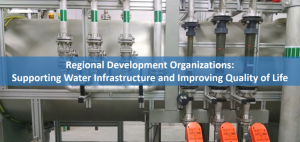This blog post is a condensed version of a more detailed article, available here.
Every day, regional development organizations (RDOs) are working to improve the lives of residents in communities across the country. Known locally as councils of governments, regional planning commissions, economic development districts, and other names, RDOs provide various types of support to their member communities in a host of service areas. Their diverse portfolio may include promoting place-based strategies in the areas of planning, housing, transportation, infrastructure, workforce development, social services, and other sectors.
RDOs are typically governed by a policy board consisting of local elected officials, along with representatives from the business community, educational institutions, the nonprofit sector, and the general public. These public-based entities play an invaluable role in fostering intergovernmental collaboration among officials at all levels of government.
RDOs can open the door to grant and loan funding, provide administrative support, and supply valuable staff support and access to technology. For rural places in particular, they can play a critical role in towns that may have limited capacity and resources due to part-time or volunteer staff that are tasked with carrying out the local functions of government.
RDOs in Action
Because of their expertise and role as regional conveners, many RDOs serve as important players—though often behind the scenes—in supporting their region’s water systems. Below are snapshots of a few of the most important roles RDOs play to support water infrastructure.
Access to Funding:
The most common way RDOs support local water systems is by helping counties and communities access funding through grant writing, administrative assistance, and capacity-building efforts. RDO staff can pursue funding from a mix of sources and provide guidance and oversight from initial grant preparation through the final project closeout. In addition to state-specific funding streams, popular federal funding sources include the US EPA Drinking Water State Revolving Fund (DWSRF), HUD Community Development Block Grants (HUD-CDBG), USDA Rural Development (USDA RD), EDA Public Works, and grants from federal-state commissions such as the Appalachian Regional Commission (ARC) and Delta Regional Authority (DRA).
Data Collection and Mapping:
RDOs serve as repositories for data, statistics, and other key information about the regions they serve. This can include information about demographics, economic development, land use, watersheds, commuter flows, and more. This knowledge can support towns and cities in making informed decisions about infrastructure planning and pursuing future investments. RDO staff’s knowledge of Geographic Information System (GIS) tools can provide critical information to communities about their utilities. Additionally, RDOs are also embracing cutting-edge forms of mapping technology, such as Light Detection and Ranging (LiDAR) to acquire data for water, sewer, stormwater, gas, and other infrastructure modeling.
Supporting Regionalization:
Given their broad scope of work and array of partners, RDOs bring a regional focus to addressing water system planning and infrastructure. With their emphasis on collaboration, RDOs can initiate projects and infrastructure improvements that promote efficiency, keep costs down for consumers, improve water quality, and break down barriers between municipalities in the pursuit of funding opportunities.
Promoting Broader Economic Development:
Without well-functioning and cost-effective utilities, economic development opportunities and business expansion prospects are severely limited for towns and cities. Water systems infrastructure and upgrades are therefore often part of larger economic development projects supported by RDOs and their partners. These can include very localized site-specific projects as well as much larger regional efforts to support an industry cluster.
Connect with Your RDO to Support Water Infrastructure Projects
As key conveners and connectors in their regions, regional development organizations are well-positioned to support water infrastructure projects that lead to economic development opportunities and overall improved quality of life for residents. By providing grant writing support, technical assistance, fostering partnerships, and more, RDOs are ready and willing to assist your community in meeting your economic and community development goals.
The National Association of Development Organizations (NADO) is a membership association that, in partnership with the NADO Research Foundation, provides training, research, and advocacy support for RDOs from coast to coast. To learn more about RDOs and NADO, visit www.nado.org. If your community is not yet connected with your local RDO or you are unsure which RDO serves where you live, please reach out to NADO Research Foundation Associate Director Brett Schwartz at bschwartz@nado.org.

